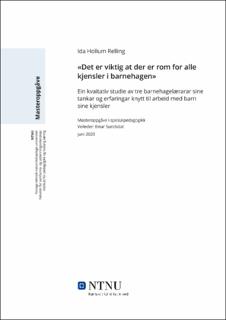| dc.contributor.advisor | Sundsdal, Einar | |
| dc.contributor.author | Relling, Ida Hollum | |
| dc.date.accessioned | 2021-09-28T17:37:15Z | |
| dc.date.available | 2021-09-28T17:37:15Z | |
| dc.date.issued | 2020 | |
| dc.identifier | no.ntnu:inspera:53268456:36652780 | |
| dc.identifier.uri | https://hdl.handle.net/11250/2784649 | |
| dc.description.abstract | Denne studien tek sikte på å få kunnskap om korleis det blir arbeida med tematikken kjensler i barnehagen. Formålet med studien var å få ei djupare innsikt i tre ulike barnehagelærarar sine tankar og erfaringar knytt til arbeid med barn sine kjensler. Utgangspunktet for studien er problemstillinga: Korleis arbeidar barnehagar med barn sine kjensler?
Eg var i denne studien oppteken av å få innsikt i og gå i djupna av pedagogar sine erfaringar og synspunkt, og valte å nytte ei kvalitativ tilnærming for å sjå nærare på mi problemstilling. Eg har gjennom semistrukturerte intervju, intervjua tre barnehagelærarar. Her har eg undersøkt korleis tre ulike barnehagelærarar arbeider med tematikken kjensler, og vidare om dei har teke i bruk nokon program eller hjelpemiddel i sitt arbeid. Eg har sett på utfordringar dei møter og gjort refleksjonar rundt barn si evne å regulere sine kjensler.
Funna frå undersøkinga viser til at gode relasjonar, sensitive vaksne og inntoning er av betyding for å forstå, hjelpe og støtte barn i deira forståing og regulering av kjensler. Vaksenrolla synast her som sentral og av betyding for barn si kjensleforståing. Vidare har min studie teke føre seg omgrepa kjensleregulering og sjølvregulering, to omgrep og evner som er ulikt omtalt og som det stillast spørsmål til. Mine funn viser til både kjensleregulering og sjølvregulering som viktige evner som kan gjere barn betre rusta i vidare skulegang, og av mine informantar blir dette også trekke fram som av betyding for barnet si psykiske helse, og vidare si psykiske helse som vaksen.
Fleire spørsmål har dukka opp undervegs i arbeidet med mi oppgåve. Avsluttingsvis gjerast det betraktningar for studien sine avgrensingar og studien sin relevans for vidare forsking. | |
| dc.description.abstract | This study aims to explore how work on the topic of feelings in kindergartens is performed. The purpose of the study was to gain a deeper insight into three different kindergarten teachers' thoughts and experiences related to working with children's feelings. The starting point for the study is this research question: How do kindergartens work with childrens feelings?
Through this study, I wished to gain insights into the educators’ experiences and viewpoints, and thus chose to use a qualitative approach. Three semistructured interviews with kindergarten teachers were performed, where their work and thoughts on the topic of emotions were examined, and furthermore whether they have used any program or aid in their work. I have looked closer into what challenges they face and reflected on children’s ability to regulate their feelings.
Findings from the study show that good relationships, sensitive adults and intonation are important for understanding, helping and supporting children in their understanding and regulation of feelings. The adult role is therefore seen as central and of importance to how children learn to handle their feelings. Furthermore, the study refers to the concepts emotion regulation and self-regulation, two terms and abilities that are differently discussed and questioned. My findings point to both emotion regulation and self-regulation as important abilities that can make children better qualified to further education, and which by the informants is highlighted as being of importance to the child’s mental health, and for good mental health in their future adult life.
Several questions have emerged during the work on this thesis. In the conclusional remarks, these relevant questions are considered and used to propose suggestions for further research on the topic of children’s feelings. | |
| dc.language | nno | |
| dc.publisher | NTNU | |
| dc.title | «Det er viktig at der er rom for alle kjensler i barnehagen» | |
| dc.type | Master thesis | |
